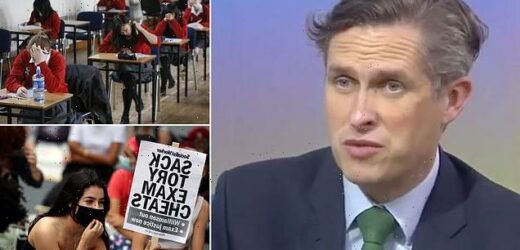Universities that refuse to offer face-to-face learning should NOT charge full £9,250 fees, say Gavin Williamson – as 91% of students are accepted on first-choice of degree while numbers heading for further education rises 5%
- Education Secretary said universities should offer discount for remote teaching
- He said he expected them to deliver face to face lessons to young people
- Nearly half of A-level results today expected to be graded at A* or at an A
- Comes after 38.6 per cent of A-level graded A or A* last year by teachers
Universities should not be charging students full fees if they are not giving face-to-face teaching, Education Secretary Gavin Williamson has said.
The minister, speaking on the morning of A-Level results being released, he said the Government expected all of them to be moving back to in person lectures and tutorials.
It came as the number of students accepted on degree courses rose by five per cent on last year after more pandemic learning.
And Mr Williamson warned the Office for Students would target and punish universities who were offering sub-standard course.
He said: ‘Universities are autonomous institutions. Our guidance is clear, our direction is clear and we do expect all universities, unless there’s unprecedented reasons, to be moving back to the situation of actually delivering lessons, lectures, face-to-face.
‘I think if universities are not delivering, not delivering what students expect, then actually they shouldn’t be charging the full fees.
‘I think universities have got to sort of stand up their offer to their own students.
‘I think that they have the flexibility and the ability to deliver face-to-face lectures, and expect them to be delivering face-to-face lectures.’
A student’s placard during a protest against Education Secretary Gavin Williamson in 2020
‘Universities have got to stand up their offers to their students, but we have got the Office for Students, which is targeting universities which have low-quality courses, which aren’t doing enough, and we will give the OFS all the power, all the backing, in order to pursue those universities that aren’t delivering enough for students that are paying their fees,’ he added to Sky News.
A record number of students have been accepted on to UK degree courses this year, Ucas figures show.
In total, 435,430 students have had places confirmed on an undergraduate course in the UK, up 5% on the same point last year, according to data published by the university admissions service.
A record 395,770 students have been accepted on their first choice full-time undergraduate course in the UK, up 8% from 365,500 in 2020.
The figures come on the day that students across England, Wales and Northern Ireland are receiving their A-level results, and students across Scotland are receiving their Highers results.
Overall, 388,230 people from across the UK have had places confirmed. This is an 8% increase on results day last year.
Mr Williamson seen in Westminster on the morning that A-Level exam results are released.
Students received their A-Level results today after their learning was disrupted by Covid
Mr Williamson today defended this year’s record high A-level grades after it was revealed nearly half of this morning’s results are expected to be A* or A – but the Tory minister admitted there may still not be exams next year with teachers allowed to decide the results again.
The Education Secretary said students ‘deserve to be rewarded’ after a year of disruption as teachers decided marks for a second year following the cancellation of exams, and said: ‘We do expect students to get better grades this year’.
He said: ‘This year is a year we can’t compare to other years. No other cohort of students have experienced this before, being kept from the classroom not once just twice’.
Mr Williamson has said the Government will consult on a contingency plan ‘largely based around’ teacher-assessed grades for next year, but with a hope to move back to an examination system.
Despite criticism about grade inflation, Mr Williamson insisted that ‘we must support these students in looking to the future’ and insisted universities and employers can have ‘confidence’ in the grades awarded today.
But critics are concerned that middle class parents with ‘sharp elbows’ might have the upper hand when it comes for appeals, with the ‘have nots’ suffering disproportionately this year because they are more likely to be marked down and not appeal their results.
Robert Halfon, chairman of the education select committee, said: ‘There’s likely to be grade inflation. The government has got to make sure the appeals system is fair and easy to engage in and not just accessible to those with barristers for parents.’
Source: Read Full Article





